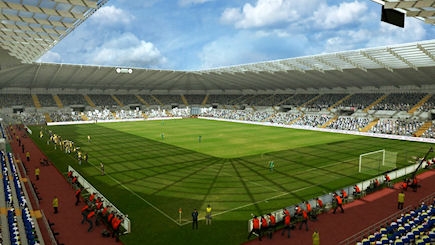This article first appeared in the Mar/Apr 2013 issue of World Gaming magazine.
Once on the brink of destruction, one of the long-time identities of UK football is back and they are bigger and better than ever. Swansea City has survived and the Swans are now dancing in one of the toughest leagues in the world!

Clockwise from top left: Jonathan De Guzmán, Pablo Hernández, Joe Allen, Miguel Pérez Cuesta
It won’t take long before the top European clubs start sniffing around Swansea City’s Liberty Stadium. Now in their second English Premier League season, their performances since joining the top flight see them more than holding their own. These recent successes will have the big names hounding Danish manager Michael Laudrup and his classy Spanish recruit Michu, especially after the Dane led the club to the League Cup final, knocking out big names like Chelsea in the process. Once one of the world’s greatest and most elegant players, Michael Laudrup’s name has been mentioned in connection with some of the biggest jobs in European football.
Swansea City are the first Welsh club ever to be promoted to the Premier League. Under Brendan Rodgers and now Michael Laudrup, they have established themselves as one of the top clubs in the league. Safe from relegation, the Swans can feel secure as some of the traditionally stronger clubs struggle in the Premier League. More surprisingly, Swansea’s football is quite joyful and easy on the eye. They attack with inspiring flair, and defend with admirable resilience. Under Roberto Martínez they built a reputation with their trademark pass-and-move football during their Championship years – a very rare sight in the often-rough second-tier of the English football pyramid. This is a method they now employ to great effect in the top-tier Premier League.
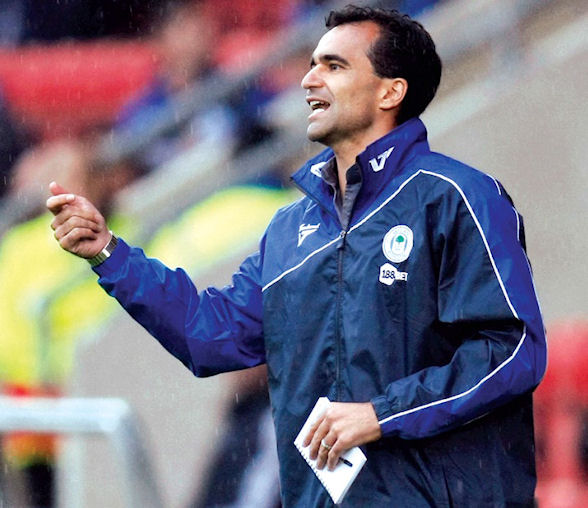
Roberto Martínez
When you consider that it was just a decade ago Swansea only avoided relegation from the bottom of the Football League to the Football Conference on the last day of the season, the rocketing rise of Swansea City is equivalent to a modern-day football miracle. In the 1970s, Swansea’s old stadium, Vetch Field, sometimes resembled a ghost town. The lowest attendance was recorded in the 1973/74 season with only 1,358 fans. They were a typical example of a club who overspent, trying to keep up with the demands of modern football. Burdening themselves with debt, Swansea almost went into administration in 2001, and thereafter were sold for one pound not once, but twice!
But it was in this very place of financial wreckage that Swansea found hope. When the club was sold to Australian businessman Tony Petty in 2001 for one pound, the first thing he did was to sack seven players, and terminate contracts with another eight. It angered the community-minded Swansea fans so much they created the Swansea Supporters’ Trust in an attempt to save the dying swan from Petty. The Supporters’ Trust raised £200,000 among the fans. A consortium of four local businessmen and the Trust bought the club, and thereafter the Supporters’ Trust owned a 20 percent stake in the club. Since then, times have changed. Now they are one of the most financially healthy clubs in England, making £14.6 million profit in the 2011/12 season, and are proud to be the only club in the Premier League with an elected supporter’s representative serving as a director on their board.
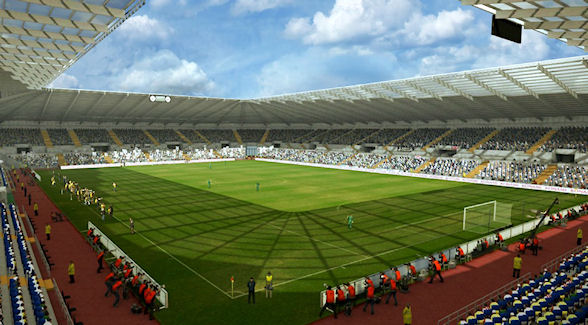
£32 million sponsored the construction of Swansea’s home ground, Liberty Stadium.
Of course, at the end of the day, it’s the football, not the club’s finances, that speak the loudest. Sitting comfortably in the middle to upper positions on the Premier League table, Swansea’s performances this season are largely due to shrewd management and smart summertime transfers. The Swans bought talented striker Michu from Spanish club Rayo Vallecano, and José Flores from Italy’s Genoa for an astonishing £2 million each. They also struck an on-loan deal with Villarreal for Jonathan De Guzmán. Laudrup is very keen to hold on to De Guzmán, and will try to secure a permanent arrangement with the now relegated Spanish club, who paid a healthy £7 million for the Canadian-born attacking midfielder. Pablo Hernández also joined Swansea from Valencia for £5.55 million. The sum of Swansea’s entire summer spending was less than the £15 million Liverpool paid Swansea for Joe Allen alone! The value of the investment is underscored by the fact the trio of Michu, De Guzmán and Hernández has become one of the most fearsome attacking forces in this season’s Premier League. At £2 million, the 26 year-old Spanish striker Michu is indisputably one the best buys in EPL history. His eye-catching performances and steady scoring rate brought Spain’s national team manager, Vicente Del Bosque, to Liberty Stadium to see him in action. One would think the Spaniard’s first international call-up is imminent.
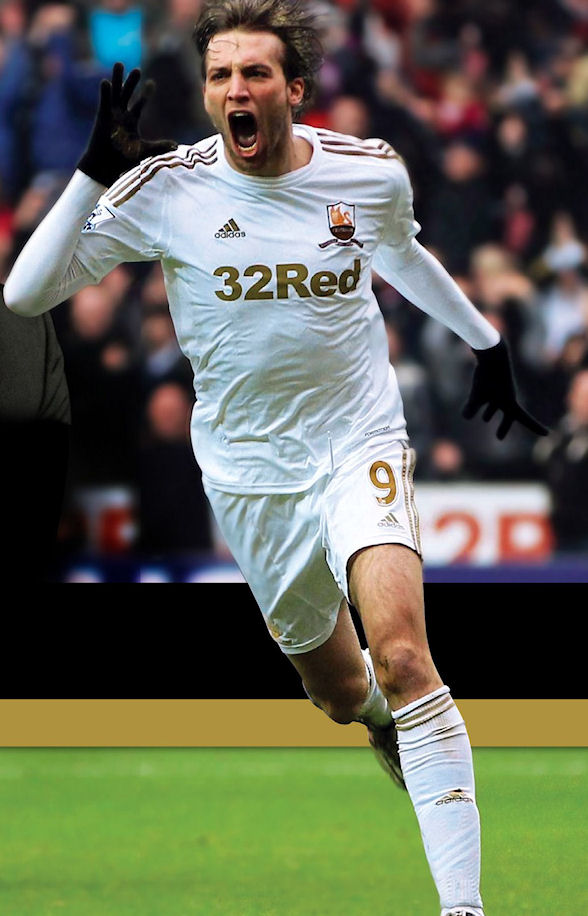
Miguel Pérez Cuesta (commonly known as Michu)
A large exodus of players last summer gave Swansea a good reason to panic, but the club’s scouting network did a fantastic job in finding quality replacements. More than just a manager, Brendan Rodgers was the Welsh club’s mentor as he led them to the Premier League, but when he left to join Liverpool, he took lynchpin player Joe Allen with him. Promising attacking midfielder, Gylfi Sigurdsson left for Tottenham Hotspur, while Winger Scott Sinclair was lured by Manchester City’s fame. The club’s chairman Huw Jenkins, a life-long Swansea supporter, worked hard to save the club’s assets, especially Joe Allen who is a product of Swansea’s youth academy. He was hostile to Liverpool’s bids, but was unable to prevent the youngster from leaving. Jenkins is realistic enough to understand that his club is a relatively small fish compared to the big English names. It is only human nature that ambitious players and managers want to leapfrog to bigger clubs when opportunity presents itself, and Jenkins understands enough to accept this as part of the bigtime. Michael Laudrup and Michu may well follow the same route. But there is one thing Jenkins can do to take care of his beloved club, and that is to find appropriate replacements with the same football philosophy as their predecessors.
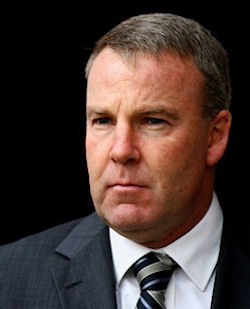
Kenny Jackett
The City Council of Swansea, at a cost of £32 million, sponsored the construction of Swansea’s home ground, Liberty Stadium. At the opening of the ground, Swansea-born Hollywood star Catherine Zeta-Jones, who hails from a Swansea-supporting family, said, “The possibility of an arena like this was always a dream for us. Now that dream has become a reality.” Her dream rolled itself a fairytale which continued for the best part of a decade – how could she have possibly known that a mere seven years later her beloved Swans would create history by reaching the League Cup final at Wembley Stadium, their first major cup final in the club’s 101-year history!

